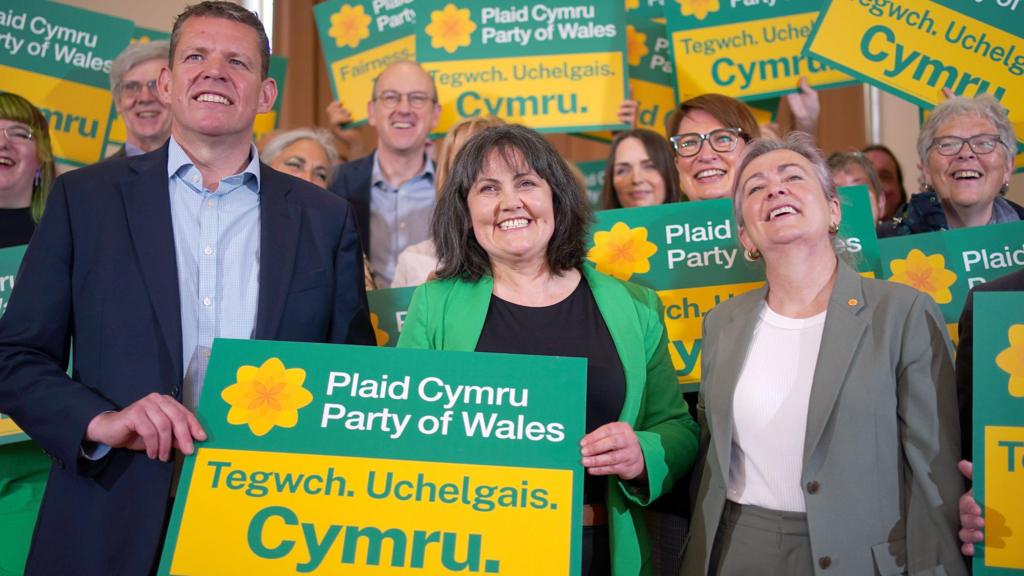On the Maes in Pwllheli, a mobile sign draws attention to a shop’s offerings: “Tarot, Crystals, Wicca, Reiki.”
Above the shop window, a subtle slate plaque can easily be missed.
In Welsh, it declares: “Plaid Genedlaethol Cymru was established in a meeting here on 5 August, 1925.”
The scene is an unusual juxtaposition, one that belies the location’s profound political significance.
A century ago, six men from two distinct nationalist factions convened here, during the National Eisteddfod on the Llyn Peninsula, to inaugurate a new chapter in Welsh political history.
In the daily churn of politics, hyperbole can be tempting. The rapid pace of events can skew our perception of their actual importance.
However, when viewed through the lens of 100 years, a clearer understanding of a party’s impact on a nation and its people emerges.
So, as Plaid Cymru reaches its centenary, what conclusions can be drawn?
“Plaid Cymru has now entered the mainstream of Welsh political life,” asserts Cynog Dafis, former Plaid MP and assembly member.
Elin Jones, the current Llywydd (presiding officer of the Welsh Parliament) and former Plaid Welsh government minister, believes: “The party needs to embrace its role as the alternative left of centre party of government.”
Leanne Wood, the party’s first female leader, reflects: “How would I grade Plaid Cymru after 100 years? Good effort, great enthusiasm, but with room for improvement.”
Mark Drakeford, Wood’s former university lecturer and Wales’ fourth Labour first minister, adds: “I think Plaid Cymru largely remains a party of protest, rather than a party of government.”
Nick Bourne, former leader of the Welsh Conservatives in Cardiff Bay and, to date, the opposition leader who came closest to securing Plaid the top position in the Welsh government following the unsuccessful coalition negotiations of 2007, states: “I believe that if you asked the Welsh public what they associate Plaid Cymru with, they would clearly say independence, the language, and the culture.
“Would they be able to identify a single other policy? I’m not so sure, to be honest.
“And that, I think, is a challenge for Plaid Cymru,” he concludes.
At its core, Plaid began as a social movement.
The initial six members were driven by a desire to promote the Welsh language and culture, as well as to achieve self-government for Wales.
To that end, Wales has achieved devolution, the number of Welsh speakers remains stable, and cultural institutions are abundant.
But ultimately, is a political party not judged by its performance at the polls?
It took more than 40 years after its founding, until 1966, for Plaid Cymru to achieve its significant breakthrough in the Westminster by-election in Carmarthen.
“It was a ground-breaking result, and one that was epoch-making,” recalls former Plaid leader Dafydd Wigley.
However, Gwynfor Evans lost the seat in the subsequent general election, though he would later reclaim the constituency in a later vote.
Despite sporadic successes – particularly the first Welsh Assembly election in 1999 – its electoral record has been uneven and often disappointing. The self-proclaimed “Party of Wales” has fallen far behind Labour and struggles to gain traction in many parts of Wales.
The locations of the two Eisteddfods that currently frame Plaid’s history – Pwllheli in 1925, and this week’s gathering in Wrexham where the party will commemorate its centenary – illustrate this point.
It wasn’t until 1974 that Plaid Cymru first represented the Pwllheli area in Westminster, and it is now at the heart of the party’s electoral stronghold on the western coast.
Wrexham, on the other hand, has never come close to electing a Plaid MP or Senedd member.
The party has never won a Wales-wide election, nor has it ever produced a Plaid first minister.
And yet, the party has consistently grappled with a fundamental tension: is its purpose to be the agent of change in Wales, or to exert pressure on Labour to move in a similar direction?
In 2021, Plaid Cymru, having finished third in that year’s Senedd election, entered into a co-operation agreement with the Welsh Labour government to ensure the implementation of some of its policies.
Speaking on the steps of the Senedd following the announcement of the deal, Adam Price, then leader of Plaid, declared: “For us in Plaid Cymru, Plaid is not the most important word – Wales always comes first.”
With the next electoral test nine months away and a new leader, Rhun ap Iorwerth, at the helm, the party has a different ambition.
Wigley himself acknowledges that he was not ready to lead in 1999, Plaid’s most successful Cardiff Bay election result to date: “We had done our work as an opposition party and had a platform for government, but we hadn’t quite got all our ducks in a row.”
With 2026 on the horizon, Plaid now has its sights firmly set on the top spot, and if some opinion polls are to be believed, it could genuinely happen.
Next year’s Senedd election, featuring a new voting system that more accurately reflects the votes cast, promises to be the most captivating since the advent of devolution.
Can Labour maintain its dominance with its well-oiled campaigning machine? Will Reform UK steal the spotlight and disrupt the established order?
Or is it finally Plaid Cymru’s moment?
That chapter of history remains to be written.
Watch ‘Plaid Cymru at 100’ on BBC One Wales at 2240 on Tuesday 5 August or catch-up on iPlayer
A previous analysis revealed Wales has the second lowest per capita spending on cultural services in Europe.
Swimming is part of the national curriculum, but Plaid contends that funding constraints limit the offerings of primary schools.
Plaid’s leaders in Wales and Westminster advocate for urgent sanctions against the Israeli government concerning Gaza.
The party argues that MPs should have the power to veto any future UK involvement in the Iran-Israel conflict.
In a Labour stronghold with a rich history of political activism, voters sense a shift in the political landscape.

